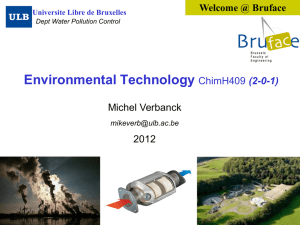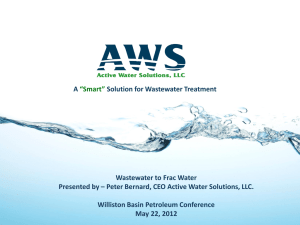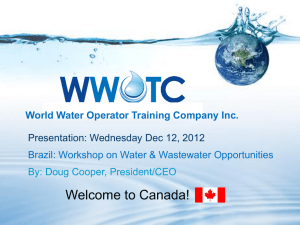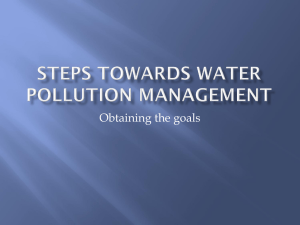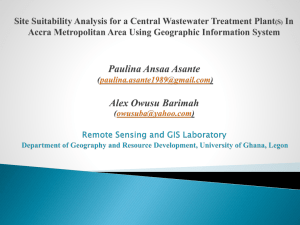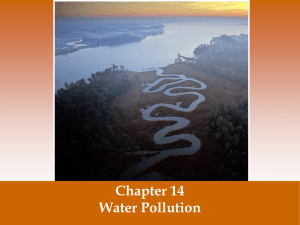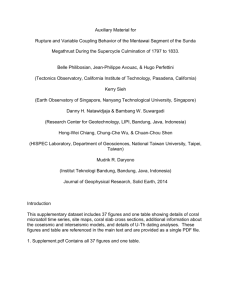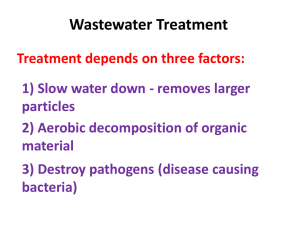Water and Wastewater Treatment in Indonesia
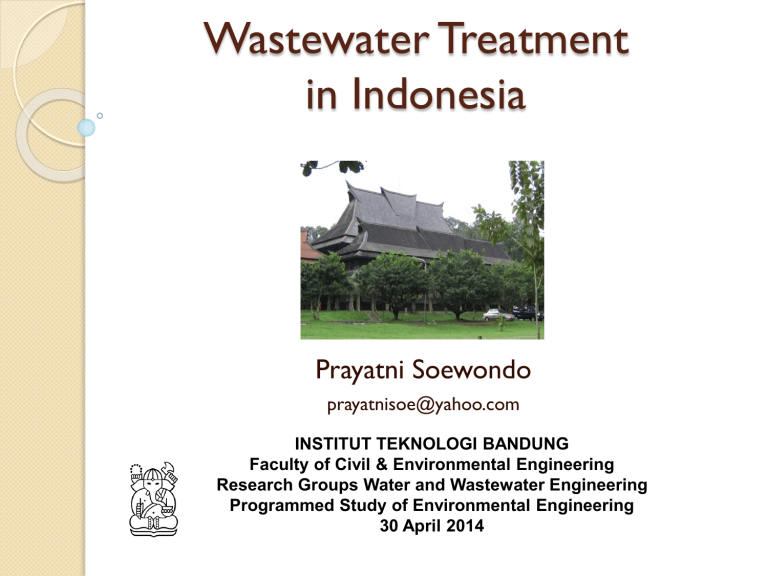
Wastewater Treatment in Indonesia
Prayatni Soewondo prayatnisoe@yahoo.com
INSTITUT TEKNOLOGI BANDUNG
Faculty of Civil & Environmental Engineering
Research Groups Water and Wastewater Engineering
Programmed Study of Environmental Engineering
30 April 2014
Contents :
Introduction
1
Current
Situation
2
Future
Developments
3
Conclusions
4
1
. Introduction
The dominant pollutant in Indonesia comes from domestic wastewater;
It is estimated to contribute about 70 % of organic loading in rivers on urban areas
The water quality is always decrease, as example : some parameters COD, BOD, nitrogen and phosphate; always increases every year
2. Current
Situation in
Indonesia
?
• Population : 247,4 million (BPS, 2013)
• Basic sanitation : 69,51 % in urban area and 33,96% in rural area (Bappenas, 2009)
• Centralized system is about 3% in only 11 cities in Indonesia
• MDG target in 2014 (Utomo, 2012) :
- centralized system will be increased until 5 %
- on site system will be increased until 90%
- the rest of sanitation system is about 5%. It will be developed communal system
• Economic loss because of bad sanitation condition in
Indonesia Rp. 1.2 million/household/year (Bappenas, 2014)
Profile of Domestic Wastewater Treatment in Indonesia
Off Site System (2000)
No City Population
(person)
(1) (2)
1 Balikpapan
2 Banjarmasin
3 Bandung
4 Cirebon
5 Denpasar (*)
6 Jakarta
7 Medan
8 Prapat (*)
9 Surakarta
10 Tangerang
11 Yogyakarta
12 Total
(3)
436.029
579.362
2.250.000
269.478
459.384
9.175.600
1.974.300
10.000
539.387
1.320.600
Served
Area
(Ha)
(4)
50.331
Served
Population
Served Area
Capacity and
Efficiency WWTP Art of treatment
Person % Ha % m3/day % Eff
(5) (6) (7) (8) (9) (10)
7.764 1,8 40 0,1 800 tad ExAE
18.378 45.700 3,5 82 0,4 5.500 Tad OXD
(11)
7.200 50 0,0 20 0,3 500 93,3 RBC
16.729 420.000 18,7 6.000 35,9 243.000 91,7 S.POND
3.736 60.000 22,3 120 3,2 13.500 Tad S.POND
23.653 181.600 35,2 1.655 7,0 51.000 Tad AELGN
65.570 1.659.000 20,3 6.260 9,6 462.600 66,7 AELGN
26.500 51.000 2,6
192,1 10.500 105,0 71,6 37,27
4.404 4.000 0,7
450 1,7 30.000 Tad UASB
60 1,4
2.010 85,0 AELGN
2.000 95,8 AELGN
906.237 20.304 60.726 6,7 1.220 6 15.500 87,9 OXL
17.910.377 236.805 2.489.940 13.9 15.977 6.75 826.410
Wastewater Treatment Plant
In Jakarta, Bandung and Medan
As example :
MCK= Mandi, Cuci dan
Kakus (Bath, wash and water closet) around
Bandung and Tangerang
On site
System
How to manage the wastewater from home industry ???
Slaughtering Houses
Tofu industry
Batik industry
Cattle farming
Location of Slaughtering Houses and
Tofu Industries Near Bandung
8
-19 villages from 55 villages lived around Citarum river
-Around 3171 cattles
Pilot Plant Model (MODEL FIXED-DOME)
Ilustrasi
Typical of Schematic Plant
Horizontal cross section
Some Villages around up stream in
Citarum River Area
Pilot Plant Bio-digester
Sources : KPBS Pangalengan, 2014
3. Future Development
Increase access to domestic wastewater services, both on-site and off-site, in urban and rural areas;
Increase financial capacities for wastewater infrastructure developments, both on-site and off-site, and also recover treatment cost to insure services;
Increase societies contribution on developing housing effluent of domestic wastewater treatment system;
Increase the work of wastewater treatment institution and separate function between regulator and operator;
Develop regulation and apply treatments according to enacted guidelines.
4. Conclusions :
Almost half of the Indonesian populations have no accessibility to wastewater facilities, which can potentially pollute the body of water.
By increasing both systems (on site and off site), the degradation of raw water quality can be reduced.
The development of technology can play a key role in improving these facilities. Most of the biological process is used to get biogas production.
Participation of the community is also very important to be concerned about.



